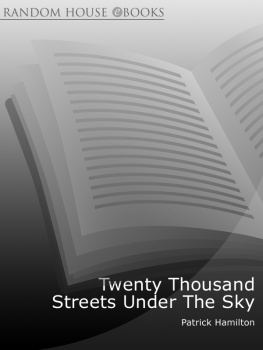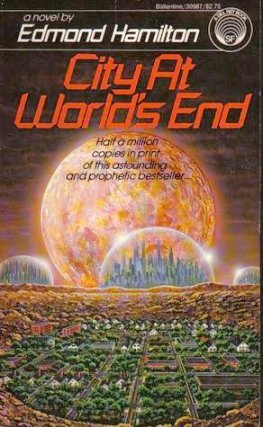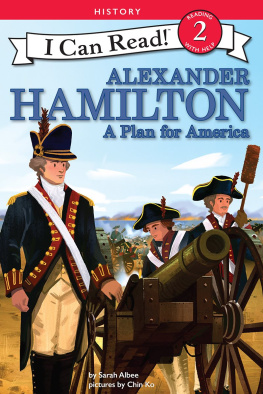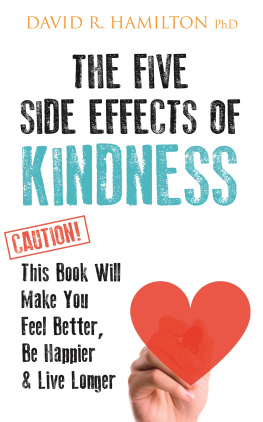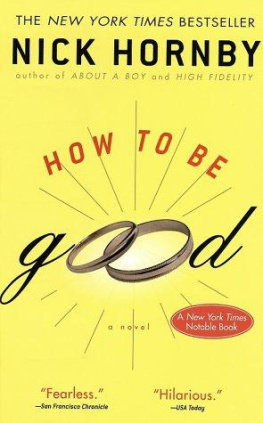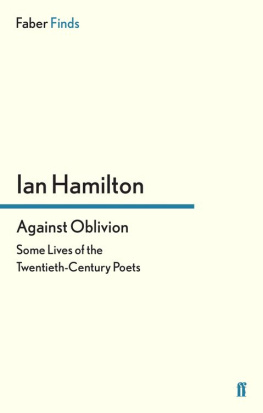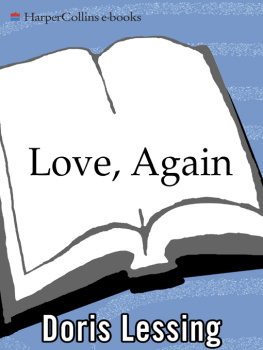About the Book
With an introduction by Michael Holroyd
The Midnight Bell, a pub on the Euston Road, is the pulse of this brilliant and compassionate trilogy. It is here where the barman, Bob, falls in love with Jenny, a West End prostitute who comes in off the streets for a gin and pep. Around his obsessions, and Ella the barmaids secret love for him, swirls the sleazy life of London in the 1930s. This is a world where people emerge from cheap lodgings in Pimlico to pour out their passions, hopes and despair in pubs and bars a world of twenty thousand streets full of cruelty and kindness, comedy and pathos, wasted dreams and lost desires.
See Also: The Secret Agent
Praise
No other English writer has written so acutely about sexual infatuation, embarrassment and self-delusion Time Out
Bleak and brilliant... an authentic lost classic Guardian
PATRICK HAMILTON
Twenty Thousand
Streets Under
the Sky
A London Trilogy
WITH AN INTRODUCTION BY
Michael Holroyd

This eBook is copyright material and must not be copied, reproduced, transferred, distributed, leased, licensed or publicly performed or used in any way except as specifically permitted in writing by the publishers, as allowed under the terms and conditions under which it was purchased or as strictly permitted by applicable copyright law. Any unauthorised distribution or use of this text may be a direct infringement of the authors and publishers rights and those responsible may be liable in law accordingly.
Version 1.0
Epub ISBN 9781446426500
www.randomhouse.co.uk
Published by Vintage 2010
13 15 17 19 20 18 16 14 12
Copyright The Estate of the late Patrick Hamilton 1987
Introduction copyright Michael Holroyd 1987
This book is sold subject to the condition that it shall not, by way of trade or otherwise, be lent, resold, hired out, or otherwise circulated without the publishers prior consent in any form of binding or cover other than that in which it is published and without a similar condition, including this condition, being imposed on the subsequent purchaser
First published in Great Britain in 1935 by Constable and Co. Ltd
Hogarth Edition published in Great Britain in 1987
First published by Vintage in 1998
Vintage
Random House, 20 Vauxhall Bridge Road,
London SW1V 2SA
www.vintage-classics.info
Addresses for companies within The Random House Group Limited can be found at: www.randomhouse.co.uk/offices.htm
The Random House Group Limited Reg. No. 954009
A CIP catalogue record for this book is available from the British Library
ISBN 9780099479161
C ONTENTS
To
D.H.
L. M. H.
M. S.
and
C. R. M.
About the Author
Born in Hassocks, Sussex in 1904, Patrick Hamilton was the youngest of three children. At the age of seventeen he began to train as an actor before realising that his talents lay in literature. In 1925, at the age of nineteen, he published his first novel Monday Morning, two more followed in quick succession, and he began to be admired and widely read. His first theatrical success was Rope (1929) on which Alfred Hitchcocks film of the same name was based. His play Gaslight was also adapted for the big screen starring Ingrid Bergman. His novels include The Midnight Bell, The Siege of Pleasure, The Plains of Cement (a trilogy later published together under the title Twenty Thousand Streets Under the Sky), Hangover Square and The Slaves of Solitude.
Hamilton died on 23 September, 1962.
ALSO BY PATRICK HAMILTON
Fiction
Monday Morning
Craven House
Impromptu in Moribundia
Hangover Square
The Slaves of Solitude
The West Pier
Mr Stimpson and Mr Gorse
Unknown Assailant
Plays
Rope
John Browns Body
Gas Light
Money with Menaces
The Duke in Darkness
Angel Street
The Man Upstairs
INTRODUCTION
P ATRICK HAMILTON WROTE this London trilogy when in his middle and late twenties. The Midnight Bell, The Siege of Pleasure and The Plains of Cement are each self-contained and were first published separately before being collected in 1935 under the title Twenty Thousand Streets Under the Sky. The Midnight Bell, which appeared in 1929 when the author was still twenty-four, is by far the most autobiographical of the three books. The tension of the narrative rises and in the last pages breaks through the structure of the novel, involving us in the emotional wreckage of Patrick Hamiltons life.
The controlling figure in his life was his father. Bernard Hamilton had been given little affection as a child and grew up without much self-esteem or self-knowledge. What a low comedian you would have made! Henry Irving had complimented him after he had been speaking at great length on the principles of religion. But Bernard Hamilton could never get his act together. He was a comedian equipped with a monocle but no sense of humour, a chameleon-like figure given to self-dramatization who nevertheless drank to be rid of himself. His children found it impossible to form a consistent or friendly relationship with him and would await with trepidation his return from various trips abroad. From Italy he came back a conscript father with a dash of Mussolini; from France he returned with an ineffable Gallic accent; Spain gave him an air of grave courtesy and a grandees dignity; alighting at Euston Station very Scotch and drunk after a journey north, he told Patrick, My boy, if ever it comes to war between England and Scotland, you and I will cross the border.
Though often absent from home, and despite violent scenes with his wife, Bernard took a solemn view of his parental duties and, having been granted a commission in the Royal Horse Artillery, would address his children in parade-ground language and have them up for military-style inspections.
Patrick grew up a silent, observant child, fretted by anxieties, and longing for some creed of certainty which he was eventually to find in Marxism. From his father he could win no support for his wish to be a writer, although this wish reflected Patricks need to feel closer to him. For Bernard, when acting the novelist, published several historical novels of which he appeared to think rather well (As a puff preliminary, he advised his publisher, you may say that this is the greatest novel ever written which indeed it is). His disinclination to help may have come from the suspicion that his son was naturally more gifted as a writer. Instead, he sent him to a commercial school near Holborn with a marvellous letter of instruction:
On Sabbath mornings you will sit, regularly, under the minister of the Scots Presbyterian Church near St Pancras. This is a parade. You will then proceed to Chiswick, reporting for Dinner at one-thirty, military time i.e. five minutes early... You will bring with you a weekly report on conduct and progress from your tutors, endorsed by the Principal. If any difficulty should arise, you are to say that, I, your father, the author and barrister, require this.
You will make enquiries as to membership of the City Volunteer or Cadet companies; I believe such bodies still exist. Understand this is an order; excuses will have no more avail with me than the preachments of Mormon missionaries.
For exercise I recommend rowing. Ascertain the conditions of membership of the London or Thames Boat Clubs you cannot hope for Leander.

